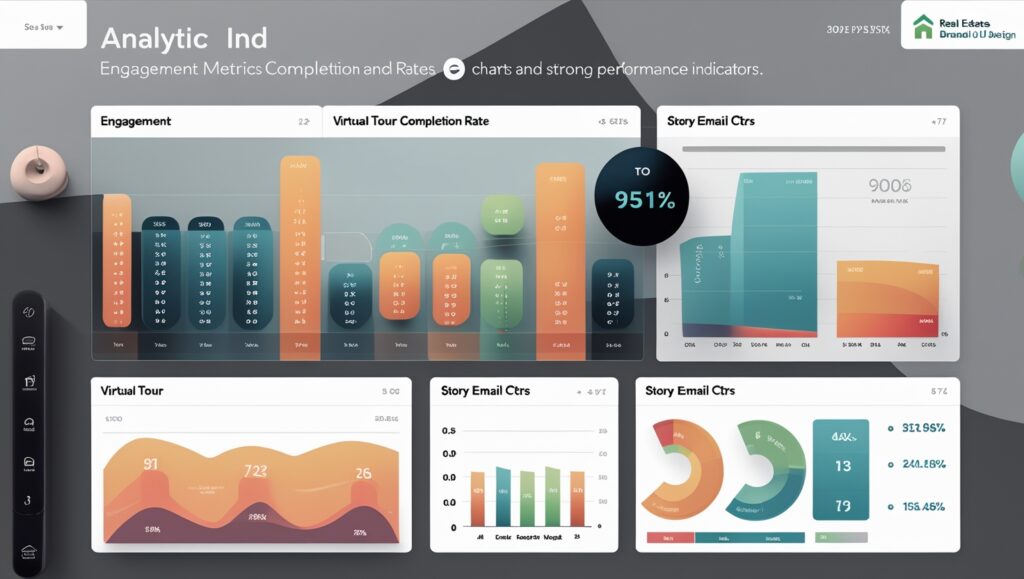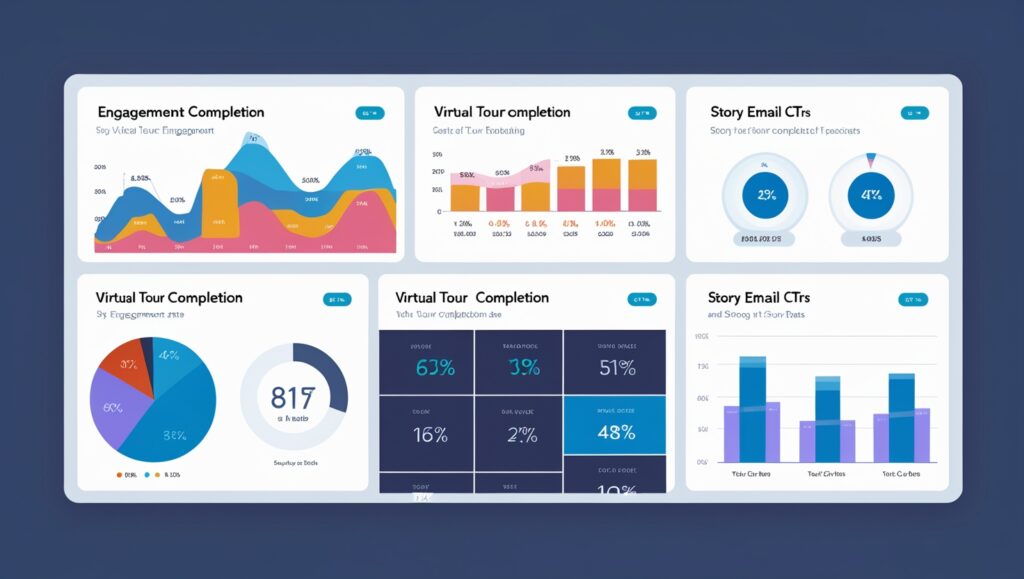In today’s competitive real estate world, standing out isn’t just a nice-to-have—it’s a must. Using AI storytelling real estate is quickly becoming a game-changer for agents and brokers who want to connect with clients and generate more qualified leads. This technology doesn’t just automate tasks; it creates stories that speak directly to people’s emotions, turning browsers into buyers.
Recent reports show that real estate pros who use AI storytelling strategies see lead conversions jump by 25-30% compared to old-school marketing methods. That’s why this approach is gaining serious traction in 2025.
Why Is AI Storytelling So Effective for Real Estate Lead Generation?
Real estate is all about stories—the family finding their dream home, the investor spotting a great deal, or the seller moving on to a new chapter. AI storytelling real estate tools take these stories to the next level by using data to create personalized narratives that genuinely connect with each buyer’s or seller’s unique needs and dreams.
Making Emotional Connections
A study by Virtuance found that property listings featuring storytelling get 20% more engagement than those listing just features and specs. When buyers can picture themselves living in a home through a story, they build a connection even before visiting.
Sarah Johnson, CMO at Luxury Presence, says, “When AI storytelling for real estate delivers hyper-personalized stories, it helps buyers emotionally connect with homes at scale.”
AI analyzes interests, behaviors, and demographics to craft stories that fit each prospect’s lifestyle, making descriptions feel custom-made rather than generic.
Key AI Storytelling Tactics Driving Lead Generation
1. Personalized Property Stories
Instead of just saying, “3-bedroom, 2-bath home,” AI creates descriptions like:
“Picture yourself waking up in this bright kitchen, enjoying breakfast while watching your kids play in the spacious backyard—a perfect home for a growing family looking for comfort and convenience.
This is possible because AI uses buyer preferences and lifestyle data to tailor stories that resonate. According to a 2024 SalesCloser AI study, agencies using these narratives saw a 35% boost in engagement and 42% more inquiries.
2. Automated Lead Nurturing Through Story Sequences
AI doesn’t stop at one story. It builds ongoing story-driven email sequences that nurture leads by:
- Identifying where buyers are in their journey
- Delivering the right message for each stage
- Adjusting based on engagement and interests
- Staying consistent without feeling pushy
Michael Chen, founder of RealTech AI, says, “Our AI storytelling real estate keeps leads engaged 45% longer than standard drip campaigns.

3. Virtual Property Experience Stories
Some agencies now combine AI storytelling for real estate with virtual tours to create immersive experiences. This includes:
- AI voiceovers tailored to the buyer’s profile
- Virtual staging matching their style
- Interactive features highlighting key property points
- Neighborhood stories showing lifestyle perks
Jennifer Lopez from Visually Sold reports a 28% increase in conversions from virtual tours using AI storytelling compared to regular tours.
How to Get Started With AI Storytelling for Real Estate
Gather the Right Data
AI storytelling real estate works best when it has solid data. Agents should:
- Use CRMs to capture detailed client info
- Track website behavior to see what content works
- Use AI chatbots for quick visitor insights.
- Use gated content to gather more profile details.
David Williams of Ylopo stresses, “Better data means better stories—and better conversions.
Build Your AI Storytelling System
Successful agencies create frameworks that mix AI with their unique brand voice:
- Define your core brand story
- Create templates for different buyer personas.
- Set tone and style rules for AI content
- Use content modules AI can mix and match.
- Have humans review critical communications
Amanda Rodriguez from Moxiworks says, “The best results come when AI powers personalization, and humans add the emotional touch.
Tracking Success With AI Storytelling
Here are key metrics to watch:
- Time spent on AI-generated property pages (usually 45% higher)
- Email click-through rates on story-driven campaigns (up 32%)
- Social shares of AI property stories (up 27%)
- Lead capture rates from AI landing pages (3.8% vs. 2.1%)
- Showing requests after AI virtual tours (28% increase)
- Lead-to-client conversion rates from AI-nurtured leads (22% higher)
Thomas Brown of Propflo says, “AI storytelling for real estate doesn’t just increase leads—it attracts buyers who are truly interested.”
Real-Life Examples: AI Storytelling in Action
Luxury Residence Realty
This agency used AI stories to:
- Tailor narratives for luxury listings
- Create lead nurturing story campaigns.
- Add AI-driven virtual tours.
They saw:
- 42% more qualified leads
- 35% faster conversions
- 28% higher final sale prices
Metropolitan Home Partners
Focusing on urban professionals, they:
- Highlighted neighborhood lifestyles with AI stories
- Created commute-based narratives
- Developed first-time buyer story sequences
Their results:
- 53% more first-time buyer leads
- 47% higher listing engagement
- 31% lower lead nurturing costs
Robert Garcia, CEO of RexTech Solutions, says, “Personalized stories create connections that really convert.
Challenges to Keep in Mind
Privacy Matters
Since AI storytelling relies on personal data, agencies must:
- Follow privacy laws like GDPR and CCPA
- Be transparent about data use.
- Protect data with strong security.
- Allow easy opt-out for users.
Keeping It Real
AI should enhance—not replace—human touch:
- Regularly check AI content for brand fit
- Blend agent knowledge into AI stories.
- Use AI to scale personalization but keep human insights.
An AI ethics expert, Emily Chen, says, “The best AI storytelling real estate makes the technology invisible—clients just feel understood.
What’s Next for AI Storytelling in Real Estate?
Predictive Storytelling
AI will soon predict buyer needs before they say it, sending the right story at just the right time.
Multi-Sensory Storytelling
Combining text, voice, video, and interaction will let buyers step into the story of their new home.
Emotional AI
Advances in emotional intelligence will help AI adapt stories in real-time, addressing feelings and objections more smoothly.
Maria Hernandez from the Real Estate AI Consortium says, “Agents who adopt AI storytelling now will lead the market tomorrow.
Final Thoughts: Join the AI Storytelling Movement
AI storytelling is reshaping real estate lead generation by creating personal, emotional connections at scale. Those who adopt this technology thoughtfully will see better engagement, higher-quality leads, and stronger growth.
It’s no longer a question of whether AI storytelling will change real estate but how fast you’ll embrace it.

FAQ: AI Storytelling in Real Estate
How does AI storytelling boost real estate lead conversions?
By crafting personalized stories that connect emotionally with buyers, AI storytelling real estate makes leads 7 times more likely to inquire and 25% more likely to buy.
What data should I collect?
For the best results, collect demographics, browsing habits, property interests, life stage information, and engagement patterns.
How much does AI storytelling real estate cost?
A: Entry-level platforms start around $200-500/month; enterprise solutions can go up to $5,000/month. Most agencies see ROI in 3-6 months.
Can AI storytelling replace agents?
No. It helps agents personalize and scale communication but does not replace human expertise in relationships and negotiations.
How do I measure success?
Track engagement, lead quality, and conversion rates, and compare AI-powered listings with standard ones using analytics dashboards.
What’s the difference between basic automation and AI storytelling?
A: AI storytelling creates dynamic, evolving narratives personalized by data, while basic automation sends fixed messages triggered by simple actions.
Can small agencies use AI storytelling?
Yes! Even small agencies can gain a competitive edge by focusing on niches, using AI-enhanced listings, and starting with affordable tools.

